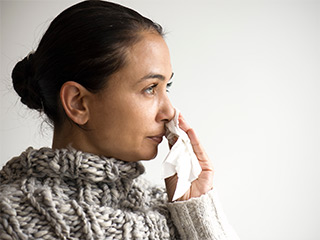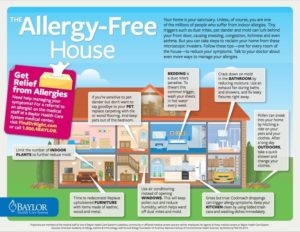How to Fight Winter Allergies

By: Kimberlee Adkins, M.D.
You survived spring pollen and summer hay fever. Now that the weather has cooled off, you’re due a break from allergies, right?
Maybe not. There are no pollens during the winter, but you still have indoor allergens — things that can cause an allergic reaction. And since you spend more time indoors during the winter, you may be affected more by these allergens than at other times. The big four home allergens are:
- Dander, the dead skin flakes of household pets such as cats and dogs
- Dust mites, tiny creepy crawlies found in bedding, carpeting and upholstered furniture
- Mold spores: Mold grows in damp areas like basements and bathrooms
- Cockroach droppings: These icky critters can live − and poop − anywhere.
Winter allergy symptoms can be confused with cold symptoms: sneezing, wheezing and itchy, watery eyes. However, cold symptoms usually pass in a week or two, so if your symptoms persist, you may have winter allergies.
Allergies At Home
It may not be possible to get rid of winter allergies entirely, but you can reduce your exposure to allergens at home:
- Clean, dust, vacuum and mop regularly, using a vacuum with a high-efficiency particulate air (HEPA) filter. If you can, avoid wall-to-wall carpeting, which provides an ideal home for dust mites.
- Get a HEPA air filter to remove particles from the air.
- Install high-efficiency furnace filters. They capture 30 times more allergens. Also, make sure your furnace fan is always on.
- Wash bedding and pajamas weekly in hot water — at least 130 degrees — to kill dust mites. Use hypoallergenic cases for mattresses and pillows to keep dust mites trapped.
- Reduce dander by bathing your pets once a week. Also, keep them out of your bedroom.
- Remove mold with a bleach solution.
Courtesy Baylor Health Care System
Treating Winter Allergies
If you take steps to reduce allergens in your home, and still suffer from allergies, you have two options for treatment:
- Over-the-counter allergy medicines to relieve your symptoms. Antihistamines and decongestants can provide temporary relief. You might also try steroid nasal sprays.
- Ask your doctor whether you should see an allergist. Allergists can test you for allergies and offer treatments, such as shots or tablets, that can provide long-term relief.
Dr. Kimberlee Adkins is certified by the American Board of Internal Medicine and sees patients in MPCP’s Columbia office.
Recommended Posts
Move Over Lyme Disease, Here Comes Babesiosis
By Timothy Klepper, M.D.
Where Are We Now With COVID-19?
By Falana Carter, M.D.
Telemedicine vs. Office Visits: Which One Do You Need?
By Stephanie McKenney Groff, D.O.





